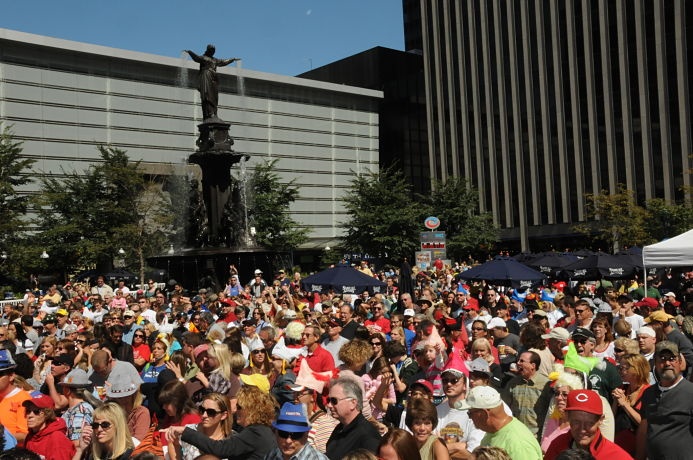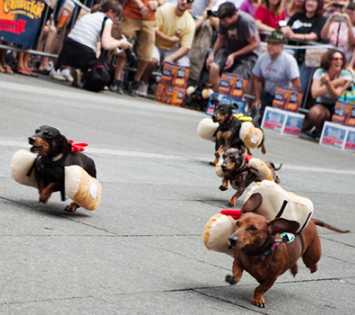 If you’re a senior living in Cincinnati, you know that German Oktoberfest celebrations are a big deal here. Beginning in the 1830s and 1840s, the Tristate received a steady influx of immigrants from modern-day Bavaria— the region where Oktoberfest originated.
If you’re a senior living in Cincinnati, you know that German Oktoberfest celebrations are a big deal here. Beginning in the 1830s and 1840s, the Tristate received a steady influx of immigrants from modern-day Bavaria— the region where Oktoberfest originated.
But, contrary to most Americans’ belief, Oktoberfests don’t usually take place in October. They’re usually held in September, or even August! Here’s a brief explanation of why.
What is an “Oktoberfest”?
On Oct. 12, 1810, Bavaria’s Crown Prince Ludwig married Princess Therese of Saxony-Hildburghausen. This brought extensive lands and wealth controlled by the Saxon duchy under control of the powerful Wittelsbach family that ruled Bavaria.
It also increased the southern German region’s influence within the flagging Holy Roman Empire and made Bavaria strong enough to begin to contend with Prussia’s ruling Hohenzollern family and Austria’s Hapsburgs for political leadership within Central Europe.
Ludwig opened the wedding festivities to the citizens of Bavaria’s capital, Munich, to ingratiate the royal family (and his new Saxon bride) to the people.
According to the city of Munich’s official website, the party was, “held on the fields in front of the city gates to celebrate the happy royal event. The fields have been named Theresienwiese (‘Theresa's fields’) in honor of the Crown Princess ever since, although the locals have since abbreviated the name simply to the ‘Wies'n.’”
The festival thereafter became an annual commemorative event, although it has not been celebrated several times — most notably during the First and Second World Wars, and during the Weimar Republic’s hyperinflation crises of the 1920s.
“In the first few decades the choice of amusements was sparse,” Munich’s website reports. “The first carousel and two swings were set up in 1818. Visitors were able to quench their thirst at small beer stands which grew rapidly in number. In 1896 the beer stands were replaced by the first beer tents and halls set up by enterprising landlords with the backing of the breweries.”
Beer tents feature Oktoberfest-style beer, which is 2 percent stronger by gravity than a typical German-style lager. Oktoberfests feature German music, cultural presentations, amusement rides and, most of all, gemütlichkeit.
Over time, the Munich festival was moved back to September to take better advantage of the weather. And that’s translated to other festivals around the world, including three of our local favorites . . .
Germania Society of Cincinnati Oktoberfest
Aug. 26-28, 2016
Germania Park
3529 West Kemper Road
Cincinnati, Ohio 45251
Cincinnati seniors especially appreciate the festival’s sense of authenticity and its German Küche, said Jason Goolsby, chair of the Society’s Jung Germania young professionals club.
“For many, it brings back memories of meals they may have had as children and brings them close to their cultural heritage,” he said.
The festival features a parade, family-friendly live music, carnival rides, beer tents, imported German crafts and more.
This year, the festival’s ceremonial Bürgermeister will be Q102 Morning Show co-host Jeff Thomas, who will lead the parade and then tap the “Cincinnati Keg” at a special ceremony on Sunday, Aug. 28 at 1:30 p.m.
MainStrasse Village Oktoberfest
Sept. 9-11, 2016
MainStrasse Village
Main Street, Covington, Kentucky
Across the river from Cincinnati, Covington also hosted a large enclave of German immigrants. In the first half of the 1840s, the small Kentucky river port’s population doubled — mostly due to the influx of die deutsche Volks.
Covington’s MainStrasse Village Oktoberfest honors the city’s German immigrant heritage with — as might be expected — food, beer, live music and artisan crafts.
There’s also a special Kinderplatz play area for children, so if you’re a senior living in the Cincinnati area, be sure to bring the grandkids and macht Spaß!
Oktoberfest Zinzinnati
Sept. 16-18, 2016
Downtown Cincinnati
NEW LOCATION: Second and Third Streets, between Walnut and Elm Streets
Today, Cincinnati is home to what is alternately billed as the largest Oktoberfest outside Munich — according to a 1987 report by the late WCPO anchor Al Schottelkotte) — or the largest Oktoberfest in the United States (we’re unable to independently verify either claim, but it’s certainly been a big deal here in the Queen City since its founding in 1976).
Held downtown, Oktoberfest Zinzinnati showcases Cincinnati’s strong German-American heritage, with all the traditional trappings: food and beer tents, music performances and one of the world’s largest chicken dances!












